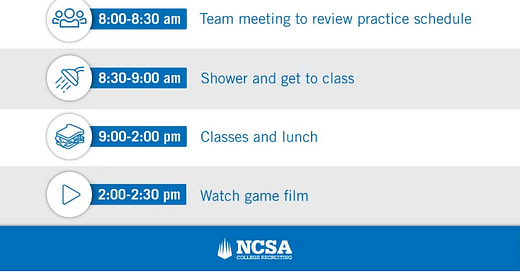#260: Is The College Athlete Schedule Harming Their Health?
While millions are being spent on athlete facilities and performance, the simplest performance enhancer is being compromised.
A recent study looked at the sleep patterns of Division 1 college athletes. The results are alarming, but not surprising. Division 1 NCAA collegiate athletes, the elite of the best, are getting approximately 6 hours of sleep per night!
That is far less than what is recommended for healthy, growing bodies, especially those under the demands of student athletes have at the highest levels.
Are they getting less sleep because they are working too hard? 40-hour work weeks are the norm in most professions. On college campuses, amateur Division I student-athletes are expected to work much longer hours.
The premier collegiate student-athletes essentially have two full-time jobs: student and athlete. To meet the demands of both, many Division I student-athletes end up committing nearly 60 hours to school and sports, leaving very little time for anything else.
That’s a long day with nothing outside of study and sport focused. This is not factoring in time for competition in season and travel. Many may need more time for study than the 1.5 hours allocated above.
It is a rigorous schedule!
With this in mind, the findings on sleep are not that surprising. But lacking sleep comes with a cost and this cost is not a precursor to good performance.
· Mood swings
· Weight gain
· Memory issues
· Trouble thinking and concentrating
· Accidents
· Weakened immunity
· High blood pressure
· Poor balance.
In “The Business of Sleep” Professor Vicki Culpin, a clinical psychologist and expert in sleep and memory, takes aim at “an age of foolishness” in which large numbers of people seem unaware of what Culpin describes as the “serious cognitive and health consequences of insufficient or poor quality sleep.
So while the NIL program has started to get these athletes some financial rewards, is sacrificing health worth it?
As it spins down to youth sports, the mentality of grinding, working harder, 6 games in a weekend are more the norm than not. This feeds the mentality at the highest levels of work coming at the expense of wellbeing.
Solutions?
Empowering our athletes and families on the importance of health. Good health means prioritizing recovery via sleep. While D1 programs are investing tons into facilities, coaches, nutrition, and recovery, simply lightening the workload may help a ton.
Better sleep means more energy, better mental sharpness, mood, academic and sport performance. If our organizations want better performance, they need to prioritize rest.
Edition #240 below outlined some solutions on getting to bed earlier, but if our athletes have too many demands on their time, they will not help much.
#240: Better Health By Prioritizing Sleep.
Welcome to edition #240. Our kids don’t sleep as well. We need to re-look at our prioritization of sleep in teaching the lifestyle habits that will keep them healthy. As adults, we can probably refresh the facts and brush up ourselves. This week examine the impact lack of sleep on our health and performance.






